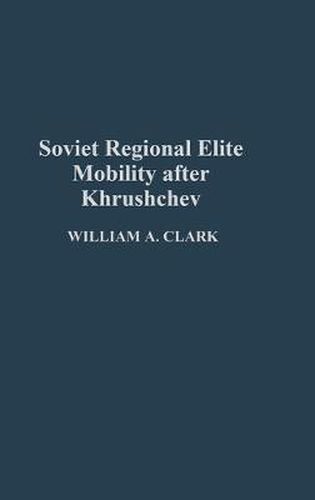Readings Newsletter
Become a Readings Member to make your shopping experience even easier.
Sign in or sign up for free!
You’re not far away from qualifying for FREE standard shipping within Australia
You’ve qualified for FREE standard shipping within Australia
The cart is loading…






Clark’s groundbreaking study covers the period in Soviet political history from the fall of Nikita Khrushchev in late 1964 through the spring of 1987 and examines the forces affecting regional elite mobility throughout the Soviet Union during these years. Turning the explanatory focus away from the traditional areas of patronage and clientelism, Clark adopts a novel approach to the subject by concentrating on structural variables such as the economic, social, and demographic aspects of the regions themselves as key elements of an explanation for long-term mobility trends. In addition to his focus on non-traditional variables, the broad chronological scope of the study and the fact that all Soviet republics with equivalent party structures are examined make Clark’s work especially valuable for graduate students and scholars of Soviet politics and government seeking a more general and inclusive explanation of regional elite mobility than has been available in previous studies of the subject.
The study is based on an exhaustive examination of the careers of over 275 Obkom (regional party committees) First Secretaries. As a result of this analysis, the 129 regional party structures of the USSR are ranked hierarchically with respect to political mobility. Throughout the study, Clark seeks to isolate non-idiosyncratic variables to explain the significant variance in mobility opportunities offered by the various regional party units. Thus, rather than relying on the traditional personalistic variables, Clark seeks to identify independent variables that have explanatory value throughout the Soviet system. Finally, Clark examines the effects of background characteristics and functional career types on elite mobility at the Obkom tier, and analyzes changes in regional cadres policy after Brezhnev. Six appendices provide additional information for the student and researcher.
$9.00 standard shipping within Australia
FREE standard shipping within Australia for orders over $100.00
Express & International shipping calculated at checkout
Clark’s groundbreaking study covers the period in Soviet political history from the fall of Nikita Khrushchev in late 1964 through the spring of 1987 and examines the forces affecting regional elite mobility throughout the Soviet Union during these years. Turning the explanatory focus away from the traditional areas of patronage and clientelism, Clark adopts a novel approach to the subject by concentrating on structural variables such as the economic, social, and demographic aspects of the regions themselves as key elements of an explanation for long-term mobility trends. In addition to his focus on non-traditional variables, the broad chronological scope of the study and the fact that all Soviet republics with equivalent party structures are examined make Clark’s work especially valuable for graduate students and scholars of Soviet politics and government seeking a more general and inclusive explanation of regional elite mobility than has been available in previous studies of the subject.
The study is based on an exhaustive examination of the careers of over 275 Obkom (regional party committees) First Secretaries. As a result of this analysis, the 129 regional party structures of the USSR are ranked hierarchically with respect to political mobility. Throughout the study, Clark seeks to isolate non-idiosyncratic variables to explain the significant variance in mobility opportunities offered by the various regional party units. Thus, rather than relying on the traditional personalistic variables, Clark seeks to identify independent variables that have explanatory value throughout the Soviet system. Finally, Clark examines the effects of background characteristics and functional career types on elite mobility at the Obkom tier, and analyzes changes in regional cadres policy after Brezhnev. Six appendices provide additional information for the student and researcher.